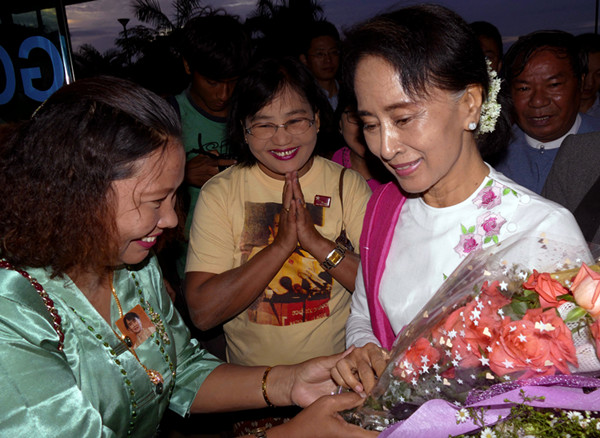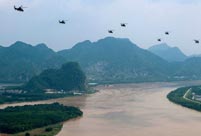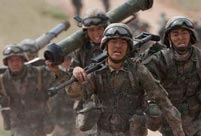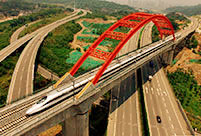

 |
| Myanmar's opposition leader Aung San Suu Kyi receives flowers from supporters at Yangon International Airport on Wednesday before her departure for China. (China Daily/ AP) |
Myanmar opposition leader Aung San Suu Kyi arrived in Beijing on Wednesday, starting a groundbreaking visit to China that is expected to consolidate another channel for Beijing to communicate with the neighboring country.
Beijing showed how important it considers the first visit of 69-year-old Suu Kyi by having the Chinese ambassador to Myanmar see her off at the airport, a rare arrangement in interparty exchanges.
She met Wang Jiarui, head of the International Department of the CPC Central Committee, on Wednesday in Beijing.
President Xi Jinping and Premier Li Keqiang will also meet Suu Kyi, leader of Myanmar's National League for Democracy, which is likely to perform strongly in elections later this year, the party has announced.
Since her release from house arrest in 2010, Suu Kyi has said that her country must maintain friendly relations with China.
Song Qingrun, an expert with the China Institute of Contemporary International Relations, said that though this is Suu Kyi's first visit to China, her family has kept close ties with the country.
Suu Kyi's father Aung San, leader of Myanmar's independence movement, sought help from the CPC in 1940 to drive away the British, while Suu Kyi's mother kept good relations with the first generation of CPC leaders, including late premier Zhou Enlai.
Suu Kyi has repeatedly expressed her wish to visit China, Song said.
He added that developing interparty and civilian exchanges with Myanmar can help ease the country's anti-China sentiments due to lack of knowledge of China and distorted reports of some Western media.
The Myanmar Times on Monday quoted political commentator U Yan Myo Thein as saying that there were "high hopes" for the trip, and talks would likely cover such sensitive and controversial projects as the Letpadaung copper mine and the Myitsone dam. The Chinese invested projects have been stalled in Myanmar, and the Myanmar reformist government has sought to reduce its heavy dependence on China.
"I believe to some extent the visit would help resolve military tensions across the border," he added.
Fighting between the Myanmar military and rebels has spilled over into China, resulting in deaths and injuries of Chinese citizens.
Though Myanmar is attracting more investment from the West and other regions, Omar Hamid, London-based head of Asia Pacific Country Risk at IHS, told The Associated Press that "in the medium-term China is likely to remain the largest investor". Hamid added that Suu Kyi will seek to position herself as a leader who can draw support from both the West and China.
Zhao Shengnan contributed to this story.
 School life of students in a military college
School life of students in a military college PLA soldiers operate antiaircraft guns in drill
PLA soldiers operate antiaircraft guns in drill Mysterious “sky road” in Mount Dawagengzha
Mysterious “sky road” in Mount Dawagengzha J-11 fighters in air exercise
J-11 fighters in air exercise Top 16 Chinese cities with the best air quality in 2014
Top 16 Chinese cities with the best air quality in 2014 PLA helicopters travel 2,000 kilometers in maneuver drill
PLA helicopters travel 2,000 kilometers in maneuver drill PLA soldiers conduct 10-kilometer long range raid
PLA soldiers conduct 10-kilometer long range raid Stars who aced national exams
Stars who aced national exams
 Hefei-Fuzhou railway line put into trial operation
Hefei-Fuzhou railway line put into trial operation Pan-democrats must choose wisely for HK
Pan-democrats must choose wisely for HK China's latest air quality threat ground-level ozone
China's latest air quality threat ground-level ozone Duped by extremists
Duped by extremists Rolling through time
Rolling through timeDay|Week